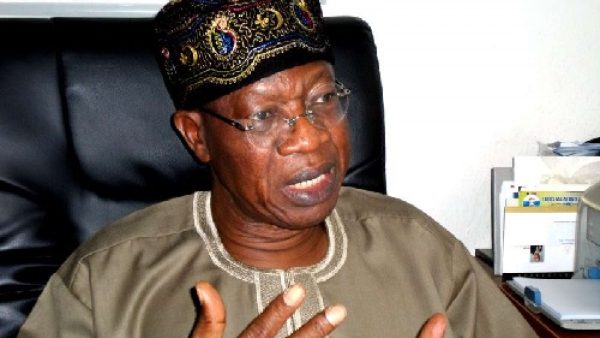The Minister of Information and Culture, Alhaji Lai Mohammed has said that for Nigeria to achieve a just and egalitarian society, appropriate legislation must be enacted to check hate speeches.
He stated this Tuesday night in Lagos at the Conference Dinner of the First West Africa Regional Round of the Oxford Prize Media Law Moot Court Competition.
The minister who raised concern over the growing prevalence of hate speeches in the country said that appropriate laws must be enacted to check the trend.
“Hate speech is becoming increasingly prevalent in all areas of our national endeavour, including religious, social, political and communal life.
“Experts, therefore, alerted that the level, trend and occurrence of hate speech constitute a threat to the peace, unity and security of the country.
“The phenomenon, if left unchecked, could grow to become a hydra-headed monster which latently and silently creates a Rwandan-type experience,’’ he said.
The minister recalled that at the run-up to the 2015 Presidential election, the National Human Rights Commission (NHRC) observed and condemned a rise in hate speech.
He said the rising spate of hate speeches worsened, even after the elections with “the rising number of violent groups and violent activities perpetrated under the cover of religious, pseudo-religious and agitation groups’’.
The minister noted that Since the 1960s, many liberal democracies have instituted laws that penalise hate speech and hate crimes in ways that limit the freedom for racists to express themselves.
“Belgian law penalises public announcements of intention to discriminate, hate or perpetrate violence against persons on grounds of race, colour, origin, descent or nationality.
“Danish law also forbids public statements that threaten, insult or degrade on account of race, skin colour, national/ethnic origin, faith or sexual orientation.
“In the same vein, Sweden punishes racial agitation, which includes expressions that threaten or demonstrate contempt on the grounds of race, colour, national/ethnic affiliation or religious belief.’’ He said.
Mohammed said he is aware that Section 39 (1) of the 1999 Constitution guaranteed freedom of expression.
He, however pointed out that Section 45 (1) of the same Constitution provides caveat that the exercise of the freedom shall not undermines public safety, public order and national security.
He therefore stressed that the necessary laws regulating hate speeches should be enacted while the existing legislation be strictly enforced and regularly reviewed.
The guest speaker at the dinner, Thiago Pinto said hate speeches is a global concern which should be addressed.
The Brazilian who said he was a victim of hate speech when he was studying in Finland recommended domestication of International statutes on the phenomenon.
Google Regional Representative, Mrs Titilayo Akinsanmi said that Google recognised the consequences of hate speeches being posted on line and committed to fighting it.
She said that not less than 400 videos are being uploaded on YouTube in every single minute.
Akinsanmi disclosed that in 2016, Google removed 92 million videos globally for the violation of their policies.
“We are deeply troubled by violence and hatred in the world and particularly by recent acts of terrorism and the rise of hate and division.
“We want to be part of the solution and we work regularly even with the legal community through platforms like this to make this happen,’’ she said.
The News Agency of Nigeria (NAN) reports the moot court session competition, hosted by the Law Faculty of the University of Lagos has participants from eight universities from Nigeria and Ghana
The Dean of the Faculty Prof. Ayodele Asemuwa, explained that moot court is a clinical session in the course of legal education where law students are given the opportunity to experience simulations of court processes and experience.
The Vice Chancellor of University of Lagos, Prof Rahaman Bello, Dons from the institution, Judges from Lagos High Court and prominent senior lawyers attended the event. (NAN)
ROT/




 Premier League
Premier League